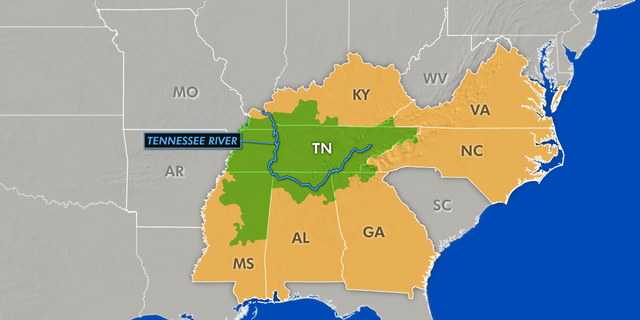Manufacturing giant 3M has been swept up in the PFAS chemical catastrophe touching drinking water systems nationwide. Over the years, 3M has been entangled in many lawsuits including one recently settled with the Alabama water authority, West Morgan-East Lawrence Water (WMEL).
There is another suit forthcoming from a north Alabama woman who says her health issues have been caused by 3M-produced chemicals.
The class of chemicals in question are per- and polyfluoroalkyl substances (PFAS). 3M was the first company to develop and sell perfluorooctanoic acid (PFOA) and perfluorooctane sulfonate (PFOS)— two of the most well-known PFAS chemicals. Prized for their nonstick properties, PFAS can be found in many common household items such as cookware and even dental floss.

The Tennessee River is in the Tennessee Valley which stretches through seven southern states.
The chemicals have been linked to testicular and kidney cancers, thyroid defects and pregnancy complications. Those complications can include fetal developmental delays such as low birth weight and skeletal variations according to the Environmental Protection Agency (EPA).
In northern Alabama, 3M produced these chemicals for decades alongside the Tennessee River.
The river is located in the Tennessee Valley which stretches through seven southern states. It courses through northern Alabama, a region populated with about 1 million people. Decatur, Ala. is the heart of the valley.
“The River City,” so named for its important Tennessee River locale, has for decades beckoned businesses. Today, a simple Google search returns a riverbank packed with manufacturers. Chief among them is 3M.
“That’s all you see here, all along the river,” lifelong resident Rhonda Engle told Fox News.
“I don’t want to drink the water.”
Engle lives in Hartselle, located 10 miles outside of Decatur. As part of Morgan County, Hartselle uses the same drinking water as Decatur via the WMEL.
According to Engle, that water is contaminated.
WMEL sued 3M in 2015 claiming the company contaminated its drinking water with PFAS.
Though 3M phased out production of PFOS in 2002, local news station WHNT disclosed that the company underreported to the Alabama Department of Environmental Management the number of chemicals it released into the Tennessee River.
Engle has been using WMEL water since she was eight years old. As a young woman, she found her passion in the logging industry.
“I loved to be able to climb up in a 200-foot tree and cut it down. I loved it,” Engle said. She and her ex-husband owned a logging company for 20 years.
“My mama always warned me, ‘Rhonda, you’re going to get hurt. You’re going to fall out of one of them trees.’ I said, ‘I got this.’ I loved it, loved it, loved it,” said Engle.
Now at age 49, Engle has one kidney and a host of illnesses that mirror parts of the EPA’s list of adverse health effects linked to PFOS and PFOA.
“I still have sugar problems, thyroid disease, high cholesterol,” she said. “I’m here with one kidney. I’m 49 years old. I’m not going to take a kidney from my kids because the same thing could happen to them and then they’re out of luck.”
The kidney cancer survivor attributes her poor health to the manufacturing chemicals that have been discharged in the Tennessee River for decades.
“I started having health problems about 20 years ago, but in February 2016 I had a seizure. That’s when they [doctors] found I had a mass in my kidney and they had to remove it,” she said. “They removed it in November 2016. It consumed my entire kidney.”

Rhonda Engle, pictured with her ex-husband, said she attributes her health issues to contaminated drinking water. (Courtesy of Rhonda Engle)
Doctors estimated that the mother of three had been living with the mass for upwards of 15 years.
“I don’t want to drink the water. I don’t even trust brushing my teeth. I have kids,” Engle said. “They literally told me—my doctors—all my children would have to be checked starting at the age of 28. I don’t trust the water to bathe.”
Engle doesn’t have much of a choice. She is on disability and earns $750 a month—all of which she believes she spends on the bottled water she uses to drink and cook.
“I would love to know that I could get my money back on all the doctors’ visits and all the medicines and all the surgeries,” Engle said.
Engle is in the beginning stages of suing both 3M and WMEL. She told Fox News she has a lawyer who is gathering her medical records from the last 15-20 years to build a case.
“I’ve had a lot of health problems that I’ve had to pay out for years and years and years and years and yes, I feel like I should be compensated for that. I lost an organ because of it,” Engle said.
3M released a joint statement with WMEL at the end of April announcing their earlier settlement on a separate case.
“3M Company, Inc. (3M) and West Morgan-East Lawrence Water and Sewer Authority (WMEL) are pleased to announce that they have settled the lawsuit between them in the United States District Court for the Northern District of Alabama. Both parties are grateful for the cooperation and work that has gone into getting this settlement finalized.
“This settlement will allow for a new filtration system at WMEL. WMEL will continue to supply safe drinking water that meets all applicable PFAS guidelines without passing on any additional construction or treatment costs—a great thing for WMEL and its customers in Morgan and Lawrence Counties.
“This settlement pertains only to the lawsuit between WMEL and 3M. Now that the litigation between WMEL and 3M is concluded, neither 3M nor WMEL will make any further statements.”
When reached for comment by Fox News, a spokesperson for 3M said it would not be appropriate to comment on Engle’s lawsuit since it has not yet been filed.
*Original article online at https://www.foxnews.com/health/pfas-contaminated-water-linked-cancer
